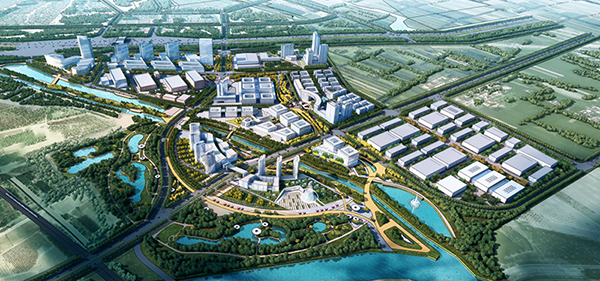
Gaocun Science & Technology Innovation Park (GSTIP) in Wuqing Development Area (UDA) began its preparation in November 2013, initiated by the Wuqing District Committee and Government. Construction of the park commenced on March 28, 2014. Wuqing Development Area has been recognized as a national-level high-tech industrial park and a national-level economic and technological development zone. As a sub-park of UDA, GSTIP is an important component of the Beijing-Tianjin-Hebei Big Data Integrated Pilot Zone. It serves as a pioneering demonstration area for the relocation of non-capital core functions.
Spanning a planned area of 1.58 square kilometers, the park is strategically focused on the development of data-driven intelligent industries. With high-level planning, top-notch construction standards, and a high starting point for investment attraction, GSTIP aims to become a technologically advanced and innovative park characterized by concentrated clustering, high-end industries, modern management, and a livable environment.
The park possesses unique advantages for developing the data industry. Firstly, its proximity to Beijing grants it the location advantage to harness the spillover effects of the capital's digital economy. Second, it enjoys a well-established core network infrastructure, with network access provided by the three major telecommunications operators. The park's direct connection to Beijing through 288 bare-core fibers enables it to serve as a hub for "fast data" convergence and application in the Beijing-Tianjin-Hebei region, while also facilitating international connectivity. Third, the park boasts comprehensive energy and resource infrastructure. In addition to ensuring a reliable supply of electricity and water for projects, it collaborates with China Huadian Corporation and State Grid Corporation to promote green energy and efficient utilization.
Fourth, the park leverages the talent resources such as Tsing Hua University's Qingshu D-lab, Zhongguancun Software Park Talent Base, and China Association of Communication Enterprises' data talent training base to support the cultivation of data industry talents and the research on data industries. The Baizhi Internet College is utilized for nurturing industrial talents. Lastly, the park supports enterprise development through initiatives such as the Haihe Jianmao Smart Technology Industrial Fund, Tsinghua's Qidi Happiness Fund, and the planned establishment of the Qingshu Artificial Intelligence Industry Fund, all of which contribute to fostering innovation and entrepreneurship in the field of big data.
Currently, the park has achieved significant aggregation effects in big data projects. It has established a three-tier data industry ecosystem comprising data infrastructure, data operation platforms, and data governance applications. First, Internet data center projects have rapidly gathered and reached a considerable scale. Operational data centers include the China Railway Main Data Center, Pacific Business Solutions & Saide Data Center, and Zhenyun Technology Data Center. The China Telecom Beijing-Tianjin-Hebei Big Data Base (Phase I) and the China International Data System Data Center (Phase I) are currently undergoing trial operations. Projects such as the Harvest Fund Operation Center and the Zoomline New Generation Artificial Intelligence Industry Base are expected to commence construction within the year.
Second, the development of data industry platforms is beginning to yield tangible results, as it leverages IDC and application enterprises to aggregate data from five industries, including healthcare and medical services, rail transit, business and finance, real estate indices, and cultural creativity. Leveraging the collaborative efforts with Inspur Group, the Tianjin Health and Medical Big Data Super Platform has been established to bring together enterprises in the healthcare and medical ecosystems, showcasing a model for industry demonstration.
Third, there has been a rapid aggregation of data integration applications, with the successful implementation of data platforms and application enterprises such as Inspur Health, China Index Academy, Turing Technology, Tianheng Information, Yunfei Tianshi, Crystal CG, Shugou Technology, and more. The park has also attracted data industry ecosystem enterprises like Chuangzhi Data, Yunshu Zhiwei, Baizhi Education, and Qingshu Technology.
In the next phase, the park will concentrate on fostering an ecosystem for the development of the data industry. There will be a continuous focus on optimizing energy supply security, strengthening talent support, constructing distinctive data platforms, and advancing the development of application platforms to enhance the overall industrial growth potential.
At the same time, the park will leverage the integrated development of industry and urban areas in the northern part of Wuqing. It will involve the integration of local resources in residential, education, healthcare, and industrial services, and conduct explorations in areas such as reusing waste heat from data centers for agricultural purposes and demonstrating the application of data in agriculture, thereby facilitating high-quality development in the region.






